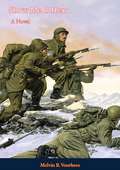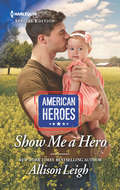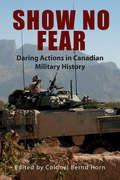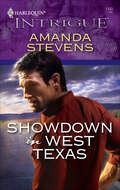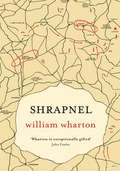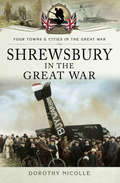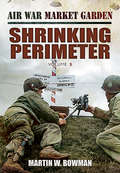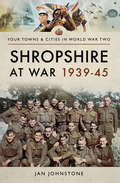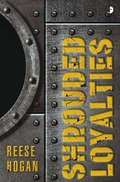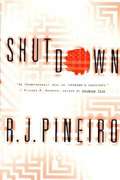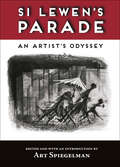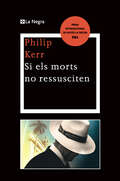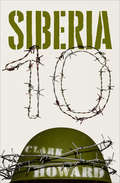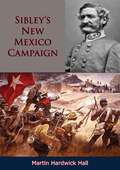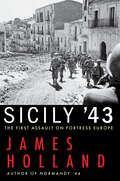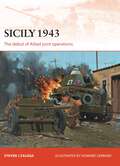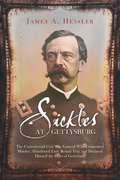- Table View
- List View
Show Me A Hero: A Novel
by Melvin B. Voorhees“Show me a hero and I will write you a tragedy” is the quotation from F. Scott Fitzgerald that supplies the poignantly appropriate title to this novel.The hero is a three-star general in field command of the U.S. Army in Korea. He is a magnificent hero—brave, profoundly patriotic, professionally skillful, intensely human. His tragedy is double-barreled: his position requires him to fight a containing war when he believes that he should fight a war to win; and his personal life is closing in defeat because his wife and son cannot share his devotion to the Army.But the book is far more than the personal tragedy of General Lark Logan. It gives a panoramic and detailed picture of a modern army action. It traces the peculiar and often humorous experiences of enlisted men; it presents the details of a grimly conscientious court martial; it follows the working press and the working espionage systems of both sides; it affords a touching picture of a brave and deeply religious superannuated chaplain. Each of the individual stories is interrelated in a fine and highly skilled mosaic of narrative that keeps the reader turning pages to see what happens next—and that always satisfies him with the solution of each dramatic situation as it develops.In the end, one is exalted by the fine picture of devoted Americans in action—Americans who, with all their blatancy and occasional commercial cynicism, live the sort of lives and perform the sort of actions which have made America great and must continue to do so.
Show Me a Hero: Surprise Baby, Second Chance / Show Me A Hero (American Heroes)
by Allison LeighShe’s not just another fan.She’s here on baby business.When small-town cop Ali Templeton shows up at Grant Cooper’s door claiming he’s the uncle of an abandoned baby, the air force veteran turned famous thriller writer is shocked. By the news…and by their instant, irritating attraction. Grant moved to Weaver for peace and quiet, not whirlwind romance. Now it’s time to step up and be a hero—for the child’s sake and his own.
Show No Fear: Daring Actions in Canadian Military History
by Colonel Bernd HornShow No Fear is a collection of essays that captures the richness of Canadian military history. Although Canadians see their nation as a peaceable kingdom and themselves as an unmilitary people, the truth is that Canada has a proud military heritage. Moreover, the nations citizens and their descendants share a legacy of courage, tenacity, and warfighting prowess. This volume of daring actions showcases the country’s rich and distinct national military experience while capturing the indomitable spirit of the Canadian soldier. Actions studied include military bravery in the Seven Years War, the British attacks on Fort Mackinac and Fort Detroit in the War of 1812, the Lake Erie expeditions during the American Civil War, courage displayed at Paardeberg in the Boer War, trench raiding in the First World War, bold valour in the ill-fated Dieppe Raid in the Second World War, toe-to-toe fighting with the Chinese in the Korean War, and present-day heroics in Afghanistan.
Show No Mercy: Show No Mercy, Take No Prisoners, Whisper No Lies, And An Excerpt From With No Remorse (Black Ops, Inc. Ser. #No. 1)
by Cindy GerardThe sexy heroes of Black Ops, Inc., a covert private security team, sizzle in New York Times bestselling author Cindy Gerard's electrifying new romantic suspense series. THE SULTRY HEAT... Only two things can compel journalist Jenna McMillan back to Buenos Aires after terrorists held her captive there just months before: a rare interview with a shadowy billionaire and the memory of the dark and dangerous man who saved her.... HIDES THE DEADLIEST THREATS... Bad guys, bombs, and bullets are Gabriel Jones's way of life. But he'll never forget the brash redhead he rescued not so long ago...or the passionate kiss they shared before he sent her packing.... AND EXPOSES THE DEEPEST DESIRES. Now, forced together by a bombing at the National Congress, Jenna and Gabe confront the urgent longings that simmer between them. But this surprise meeting is no coincidence. A ruthless enemy stalks them with deadly precision. The question is...if they make it out alive, will Gabe turn his back on Jenna...again?
Show of Force: Show Of Force (declan's Defenders) / Smokies Special Agent (the Mighty Mckenzies) (Declan’s Defenders #2)
by Elle JamesA former marine must help a Russian spy…But can he trust her?Force Recon marine Mack Balkman would do anything for Declan’s Defenders and the boss who gave him a second chance. But aiding a rogue Russian spy pushes his loyalty to the limits. Beautiful, cunning Riley Lansing loves her adopted country—and her baby brother, who is being held for ransom. Can they work together to find the young boy before Riley’s handler learns that she has gone rogue?Declan’s Defenders
Show the Colors
by Luke ShortFive of the fourteen soldiers would survive either by raw courage or blind luck. One of them was a traitor who had sold the Indians stolen Winchester rifles. Now Breed faced a court-martial that could put him in front of a firing squad, unless he rode hell-for-leather to freedom and the woman who could prove his innocence.
Showdown (Stud Games #3)
by Cindy DeesA Stud Games NovelIn crime, like in love, there can be no half measures…. Fashion model Zane Stryker needs money—badly. At almost thirty, his glory days are behind him, and he needs capital to start over. When his luggage is switched with a bag containing contraband he’s forced to deliver, it’s either the worst thing that’s ever happened to him… or the best. Enter Sebastian Gigoni, formerly of the British Special Forces, who has to decide just where Zane’s loyalty lies and why. Sizzling attraction erupts between them, but that doesn’t mean they can trust each other. They double down in a race for their lives—and their love—but are their purposes at odds? As they struggle to reconcile their goals, their consciences, and the needs of their hearts, one thing is clear—they must go all in or give up altogether. Previously published by Dreamspinner Press as All In by Ava Drake, July 2017.
Showdown at Shadow Junction
by Joanna WayneFAILURE ISN'T AN OPTION FOR THIS NAVY SEAL IN JOANNA WAYNE'S LATEST BIG "D" DADS: THE DALTONS NOVEL When Jade Dalton escapes a ruthless kidnapper on the trail of a multimillion-dollar necklace, she flees to the one place no one will find her: her estranged father's Texas ranch. Booker Knox is also on his way to Dry Gulch. After a potentially dangerous situation thrusts her into his arms, the navy SEAL appoints himself Jade's personal bodyguard. It isn't every day Booker finds himself being kissed by a gorgeous stranger. Except Jade's a fugitive from justice who's also being hunted by a determined killer. Now Booker will do whatever it takes to protect the beautiful big-city event planner. Failure isn't an option. Neither is walking away when this is all over.
Showdown in West Texas
by Amanda StevensCochise County needed a new deputy and Cage Nichols needed a cover-pronto. Unfortunately, Cage unknowingly assumed the identity of an undercover hit man who'd marked stand-in Sheriff Grace Steele to be murdered.He was an ex-cop sidelined by a bullet. Now, Cage was embedded in the dusty West Texas border town with no choice but to assume the role of a double agent in order to expose a conspiracy and to protect his own hide. That was the plan. Until he met Grace.Whether it was the isolation of the no-man's-land town of Jericho Pass or the intense desert heat, he couldn't say, but Cage was fast falling for Grace. He only hoped she wouldn't lock him up after he saved her.
Shrapnel
by William WhartonAuthor of such classic wartime novels as Birdy and A Midnight Clear, William Wharton was one of the most acclaimed writers of his generation. However, he was also a very private man--he wrote under a pseudonym and rarely gave interviews--so fans and critics could only speculate how much of his work was autobiographical and how much was fiction. Now, for the first time, we are able to read the authors own account of his experiences during World War II--events that went on to influence some of his greatest works. These are the tales that Wharton never wanted to tell his children. Together, they illuminate a deeply personal, transformative experience: of learning to kill, to "abandon my natural desire to live, survive, and to risk my life for reasons I often did not understand and sometimes did not accept. " Moving and insightful, Shrapnel is a powerful, timeless work from an acclaimed American master.
Shrewsbury in the Great War: Shrewsbury In The Great War (Your Towns & Cities in the Great War)
by Dorothy NicolleWars are not just about the people who fight. Those who wait at home suffer too. This book gives an insight into how the people of Shrewsbury lived through those years. Chapters describe the arrival in the town of Belgian refugees and, not long afterwards, of prisoners of war and the reaction of the local people to them all; the enlistment and later conscription of men and the tribunals held to consider the applications of those who wanted to avoid being called up; the establishment of hospitals in local houses for the treatment of the war wounded; and finally the raising of subscriptions for memorials to those who had been killed.Throughout this period most people tried to live as normal a life as possible, despite the absence of so many of their menfolk. They had to cope with food shortages and new laws that restricted so many aspects of their lives. Alongside this they lived with the constant dread of news from the front.
Shrinking Perimeter (Air War Market Garden)
by Martin W. BowmanThe third volume of this four-part series on Operation 'Market-Garden' in September 1944 draws on many individual soldiers and airmen's narratives to tell the story of the ongoing fight to keep the Hell's Highway' open to relieve 1st Airborne at Arnhem, and the brave attempts to re-supply them from the air. As in previous volumes, this account offers a unique perspective on all aspects of aerial activity during this pivotal operation. This volume tells of the Allied effort to retain supremacy in the skies. Individual tales of gallantry work to humanize the account, rooting the action very much in the human experience of conflict. Such tales include the never to be forgotten story of the 'Angel of Arnhem' and the acts of chivalry that existed on both sides - even among battle hardened units such as the SS Panzer Grenadiers. All are unique in the annals of war. These and the other personal recollections of Allied soldiers and airmen and their German adversaries tell of extreme courage, camaraderie and shared terror under fire. And they are complemented by the author's background information that puts each narrative into wartime perspective.
Shropshire at War, 1939–45 (Your Towns & Cities in World War Two)
by Janet JohnstoneWith the outbreak of the Second World War, Shropshire authorities immediately implemented pre-arranged plans to cope with the approaching conflict on the Home Front, including the building of air raid shelters and pillboxes and the renovation of redundant camps and disused airfields.Men not eligible for the services volunteered for the LDV (later the Home Guard), the AFS and the ARP. Women were recruited for a variety of other posts, with members of the WVS dealing with a massive influx of evacuees from Merseyside and Smethwick right from the start.Shropshires factories turned to armament production, coal mines increased their output and farmers cultivated more acreage (an extra 47,000 acres ploughed for food production in the first year of the war).PoW Camps sprang up, with prisoners frequently seen being transported to work on local farms, while uniformed servicemen and women from Britain, the Commonwealth and America became familiar sights on the streets.Using a variety of sources, including newspapers and verbal testimonies, the author paints a picture of the effect that six years of war had on those Salopians who, when others marched away, remained on the Home Front. Their struggles, acceptance of shortages, hardships and determination not to give in are reflected throughout this book.
Shrouded Loyalties
by Reese HoganA soldier returns home with a dangerous secret from an alternate realm, unaware that she is surrounded by spies and collaborators, in this intense military science fiction novel.Naval officer Mila Blackwood is determined to keep her country’s most powerful secret – shrouding, the ability to traverse their planet in seconds through an alternate realm – out of enemy hands. But spies are everywhere: her submarine has been infiltrated by a Dhavnak agent, and her teenage brother has been seduced by an enemy soldier. When Blackwood’s submarine is attacked by a monster, she and fellow sailor, Holland, are marked with special abilities, whose manifestations could end the war – but in whose favor? Forced to submit to military scientists in her paranoid and war-torn home, Blackwood soon learns that the only people she can trust might also be the enemy.File Under: Science Fiction [ Enemy Within | Periscope Down | Gods and Monsters | Lightning Strikes Twice ]
Shut Up and Kiss Me (Stallion Pass: Texas Knights #1)
by Sara OrwigA MAN, A WOMAN…A BABY?Colonel Mike Remington wasn'ta man who backed away froma challenge. But the tough,combat-hardened Special Forcesofficer knew he was way out of his league when hecradled an adorable baby in his arms—and an elegant,enticing lady lawyer told him he was the little girl'sbrand-new “daddy”….The only solution to his sudden baby problem wasmarriage—in name only—to the lady lawyer herself. Butthe more time he spent on a secluded Texas ranch withthe beautiful, sensual Savannah Clay—and the more“innocent” kisses they shared—the more he ached to seethis make-believe marriage turn into the real deal….
Shutdown
by R. J. PineiroA faulty computer chip causes a fatal train accident, sending its manufacturer into a downward spiral. When the chip is traced to sabotage, an FBI agent and a hacker team up to investigate before the next shutdown.
Si Lewen's Parade: An Artist's Odyssey
by Si LewenA pioneering, wordless graphic novel detailing the horrors of war in the 20th Century, featuring an overview of the artist’s career.Si Lewen’s Parade is a timeless story told in a language that knows no country—a wordless epic that, despite its muteness, is more powerful than the written or the spoken word. First published in 1957, TheParade is a lost classic, newly discovered, remastered, and presented by Art Spiegelman, the Pulitzer Prize–winning author of Maus. Reproduced in print as a unique two-sided accordion-fold format with an extensive overview of the artist’s career on the verso, The Parade is a celebration of art and the story of recurring war as Si Lewen experienced it over the past 90 years, watching the joyful parades that marked the end of World War I lead into the death marches of World War II and the Korean War. As The Parade unfolds, the reader is taken on an unforgettable journey of sequential images.“An eloquent and vigorous protest against war’s horror and futility.” —New York Times, from an exhibition review of The Parade, 1953“Nothing can equal the psychological effect of real art. . . . Our time needs you and your work!” —Albert Einstein, from a letter to Si Lewen, 1951“The Parade is a powerfully moving free-jazz dirge of a book that depicts mankind’s recurring war fever. It remains sadly urgent and relevant today.” —Art Spiegelman, from his introduction“A compelling testament to Lewen’s gifts for stirring our souls with the silent grace of painted panel after panel after panel. As narrative, it is music by which to mourn Man’s fate.” —The Washington Post
Si els morts no ressuciten
by Philip KerrCínic i descarat, però honest i sensible, Bernie Gunther és el protagonista de la sèrie «Berlin Noir», amb què Philip Kerr ha conquerit lectors d'arreu del món. Guanyadora del III Premi Internacional de Novel·la Negra RBA. Un any després d'abandonar la KRIPO, la Policia Criminal alemanya, Bernie Gunther treballa a l'Hotel Adlon, on s'allotja la periodista nord-americana Noreen Charalambides, que ha arribat a Berlín amb la intenció d'investigar el creixent fervor antisemita i la sospitosa designació de la ciutat com a seu dels Jocs Olímpics de 1936. La Noreen i en Gunther s'associen dins i fora del llit per seguir la pista d'una trama que uneix les altes esferes del nazisme amb el crim organitzat dels Estats Units. Però la Noreen és obligada a tornar al seu país, i en Gunther, una vegada més, haurà de contemplar com una dona se li escapoleix. Fins que, al cap de vint anys, tots dos es retroben a l'Havana de Batista, un temps abans de la Revolució.
SiGe-based Re-engineering of Electronic Warfare Subsystems
by Saurabh Sinha Wynand LambrechtsThis book provides readers a thorough understanding of the applicability of new-generation silicon-germanium (SiGe) electronic subsystems for electronic warfare and defensive countermeasures in military contexts. It explains in detail the theoretical and technical background, and addresses all aspects of the integration of SiGe as an enabling technology for maritime, land, and airborne / spaceborne electronic warfare, including research, design, development, and implementation. The coverage is supported by mathematical derivations, informative illustrations, practical examples, and case studies. While SiGe technology provides speed, performance, and price advantages in many markets, to date only limited information has been available on its use in electronic warfare systems, especially in developing nations. Addressing that need, this book offers essential engineering guidelines that especially focus on the speed and reliability of current-generation SiGe circuits and highlight emerging innovations that help to ensure the sustainable long-term integration of SiGe into electronic warfare systems.
Siberia 10
by Clark HowardAs the Vietnam War rages, blood will be shed at a stateside Marine Corps prison, in this novel by a &“superlative storyteller&” (Publishers Weekly).Siberia 10 is a military prison in California, and tensions are coming to a slow boil within its walls. Inmates are trying to escape; guards are practicing constant brutality; racial tensions are seething. Those confined to Siberia 10 have been trained to fight and kill—and in the midst of chaos, things could turn lethal. Into this tinderbox comes Garth Hannon, pulled out of action in Vietnam and flown back to the States for a special assignment: to solve the problem of Siberia 10. But before Hannon can assess the situation and diffuse a time bomb, it may all blow up in his face, in this suspenseful military thriller by an Edgar Award–winning author.
Sibley's New Mexico Campaign
by Martin Hardwick HallThis long out-of-print and hard-to-find classic tells the story of the Texas invasion of New Mexico during the American Civil War. In early 1862, Confederate General Henry Hopkins Sibley marched thirty-four hundred coarse Texas farmboys, cowhands, and frontiersmen into New Mexico and up the Rio Grande Valley. Although seriously bloodied, they repulsed Union troops at the Battle of Valverde. As the poorly supplied Texans pushed northward, New Mexicans stripped the land bare of food, fodder, and livestock. East of Santa Fe at Glorieta, Union volunteers defeated Sibley's Confederates and burned their quartermaster trains, and the starving Texans retreated back down the Rio Grande to El Paso.-Print ed.
Sicherheits- und verteidigungspolitische Neujustierungen: Friedensethik nach der Zeitenwende • Band 1 (Gerechter Frieden)
by Ines-Jacqueline Werkner Anna LöwMit dem russischen Angriffskrieg gegen die Ukraine haben sich die sicherheits- und verteidigungspolitischen Konstellationen fundamental verändert – nicht nur in Deutschland, sondern in ganz Europa. Vor diesem Hintergrund diskutieren die Autorinnen und Autoren des Bandes die Neujustierungen in der deutschen Sicherheits- und Verteidigungspolitik. Dabei stehen zum einen die beiden zentralen Dokumente – die Nationale Sicherheitsstrategie und die neuen Verteidigungspolitischen Richtlinien – im Fokus der Betrachtung. Zum anderen richtet sich der Blick auf die Folgen der US-amerikanischen Wahl im November 2024 für die Sicherheit und Verteidigungsfähigkeit Deutschlands und Europas. Das schließt auch Fragen der nuklearen Abschreckung mit ein.
Sicily '43: The First Assault on Fortress Europe
by James HollandA history of World War II’s Operation Husky, the first Allied attack on European soil, by the acclaimed author of Normandy ’44.On July 10, 1943, the largest amphibious invasion ever mounted took place, larger even than the Normandy invasion eleven months later: 160,000 American, British, and Canadian troops came ashore or were parachuted onto Sicily, signaling the start of the campaign to defeat Nazi Germany on European soil. Operation Husky, as it was known, was enormously complex, involving dramatic battles on land, in the air, and at sea. Yet, despite its paramount importance to ultimate Allied victory, and its drama, very little has been written about the thirty-eight-day Battle for Sicily.Based on his own battlefield studies in Sicily and on much new research, James Holland’s Sicily ’43 offers a vital new perspective on a major turning point in World War II and a chronicle of a multi-pronged campaign in a uniquely diverse and contained geographical location. The characters involved—Generals George Patton and Bernard Montgomery among many—were as colorful as the air and naval battles and the fighting on the ground across the scorching plains and mountaintop of Sicily were brutal. But among Holland’s great skills is incorporating the experience of on-the-ground participants on all sides—from American privates Tom and Dee Bowles and Tuskegee fighter pilot Charlie Dryden to British major Hedley Verity and Canadian lieutenant Farley Mowat (later a celebrated author), to German and Italian participants such as Wilhelm Schmalz, brigade commander in the Hermann Göring Division, or Luftwaffe fighter pilot major Johannes “Macky” Steinhoff and to Italian combatants, civilians and mafiosi alike—which gives readers an intimate sense of what occurred in July and August 1943.Emphasizing the significance of Allied air superiority, Holland overturns conventional narratives that have criticized the Sicily campaign for the vacillations over the plan, the slowness of the Allied advance and that so many German and Italian soldiers escaped to the mainland; rather, he shows that clearing the island in 38 days against geographical challenges and fierce resistance was an impressive achievement. A powerful and dramatic account by a master military historian, Sicily ’43 fills a major gap in the narrative history of World War II.Praise for Sicily ’43A New York Times Book Review Editors’ ChoiceNamed a Best History Book of the Year by the Wall Street Journal“Academic histories are all very well, but at times it is a pleasure to sit back and wallow in an old-school military tale of flinty-eyed men doing battle. That is what James Holland, a seasoned craftsman, offers in Sicily ’43.” —New York Times Book Review“Crisp, detailed, and entertaining. Holland refuses to let the legends overshadow the flesh-and-blood soldiers who fought, bled, and died. Sicily ‘43 is an outstanding look at a stepping-stone to victory.” —Wall Street Journal
Sicily 1943
by Steven Zaloga Howard GerrardNot only did the Sicily operation represent a watershed in tactical development of combined arms tactics, it was also an important test for future Allied joint operations. Senior British commanders left the North African theater with a jaundiced and dismissive view of the combat capabilities of the inexperienced US Army after the debacle at Kasserine Pass in Tunisia in February 1943. Sicily was a demonstration that the US Army had rapidly learned its lessons and was now capable of fighting as a co-equal of the British Army. The Sicily campaign contained a measure of high drama as Patton took the reins of the Seventh US Army and bent the rules of the theater commander in a bold race to take Palermo on the northern Sicilian coast. When stiff German resistance halted Montgomery's main assault to Messina through the mountains, Patton was posed to be the first to reach the key Sicilian port and end the campaign. The Sicily campaign contains a fair amount of controversy as well including the disastrous problems with early airborne assaults and the Allied failure to seal the straits of Messina, allowing the Germans to withdraw many of their best forces.
Sickles at Gettysburg: The Controversial Civil War General Who Committed Murder, Abandoned Little Round Top, and Declared Himself the Hero of Gettysburg
by James A. HesslerA well researched fair and balanced portrayal of the controversial Major General Daniel E. Sickles during the civil war in 1863, this biography is an easy read and gives us a detailed insight into the events.
